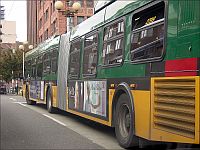
Last November, Seattle-area voters gave a resounding shout-out to mass transit. Building on that support, a new bill in Washington state focuses on sustainable development near transit stations. This "Creating Transit Communities" legislation calls for dense, walkable communities in transit hot-spots.
It would provide local jurisdictions with resources and incentives for sustainable growth and strengthen existing provisions about making low-income housing available near transit centers.
Think those are unrelated issues? No way, say bill supporters from Futurewise, Washington Low Income Housing Alliance, and Transportation Choices Coalition. "Our state may face no challenge greater than the threat of global warming and the lack of sufficient affordable housing," they argue in a recent Seattle P-I editorial, "and we can’t solve either unless we solve both."
They go on to illuminate the connections:
The lack of affordable housing pushes people to live farther from jobs and community services, creating longer commutes. More time spent in cars increases vehicle miles traveled, which leads to greater greenhouse gas emissions. Development at the urban fringe converts working farms and forests to urban uses, resulting in less carbon-sequestering open space and tree canopy.
If that isn’t enough for you, the loss of rural and resource land threatens local food security, eliminates wildlife habitat and has been linked to the degradation of Puget Sound. Lack of housing affordable to low- and moderate-income earners exacerbates poverty issues, adding pricey transportation costs to household expenses.
To top it off, the increased infrastructure costs to expand roads and build sewer lines to urban fringe development is an enormous economic burden on all taxpayers …
A complicated series of cause-and-effect, no doubt. But it’s all solvable, they say, with some careful planning … and the transit-oriented communities bill.
In related news, mass transit ridership is in an upswing trend across the country just as agencies are having to cut services due to dwindling funds. Maybe that’s why Seattle bus rides will cost you another quarter starting on Sunday.


